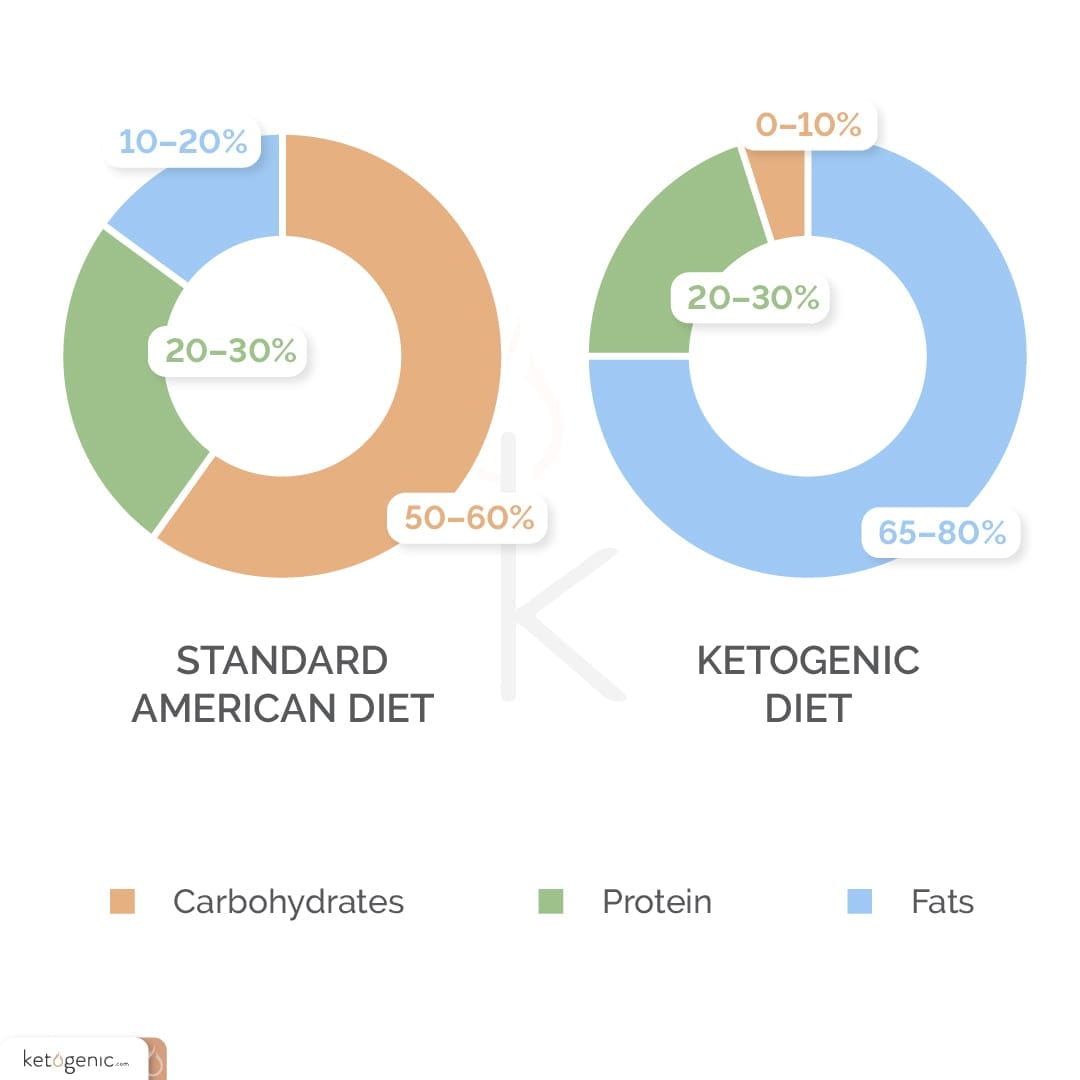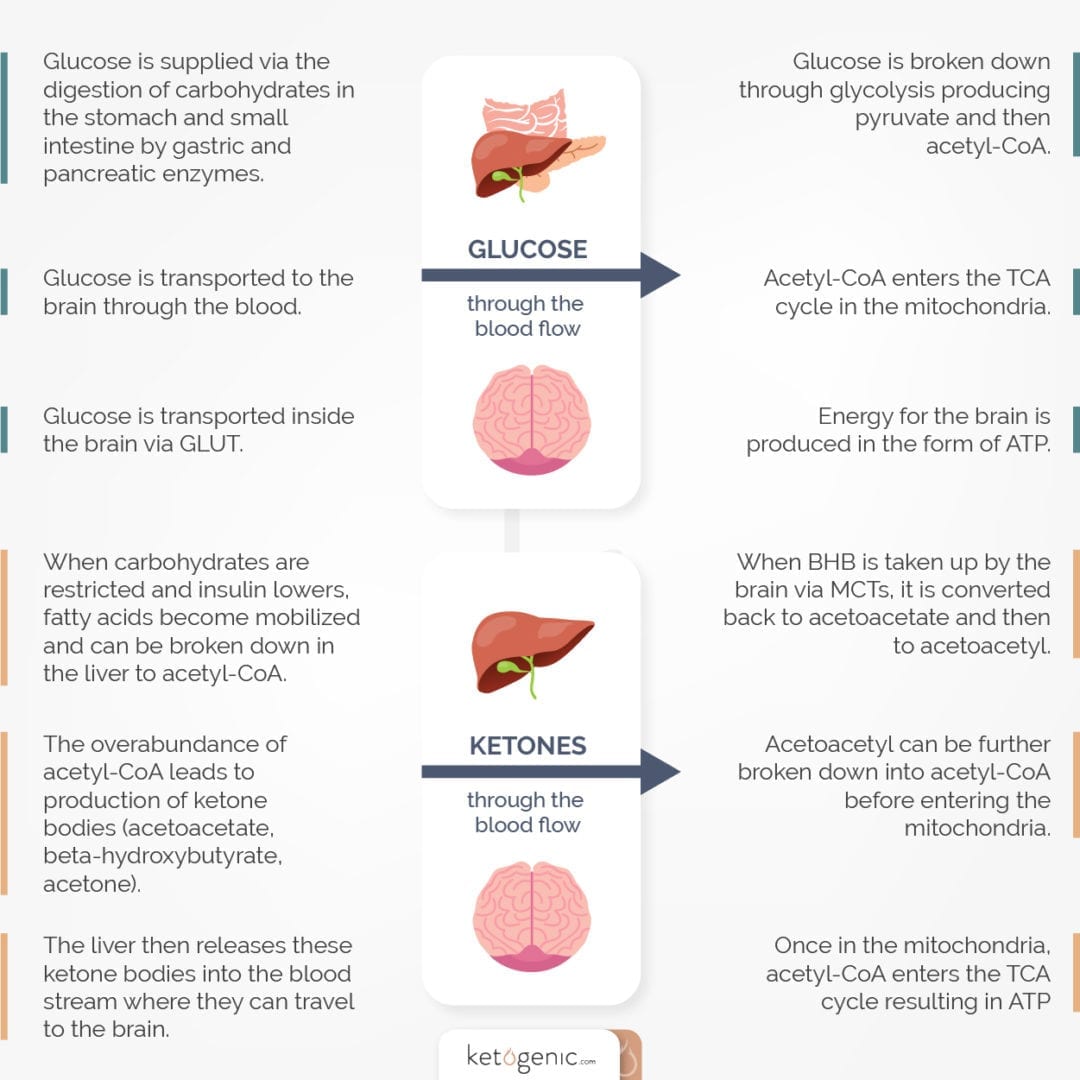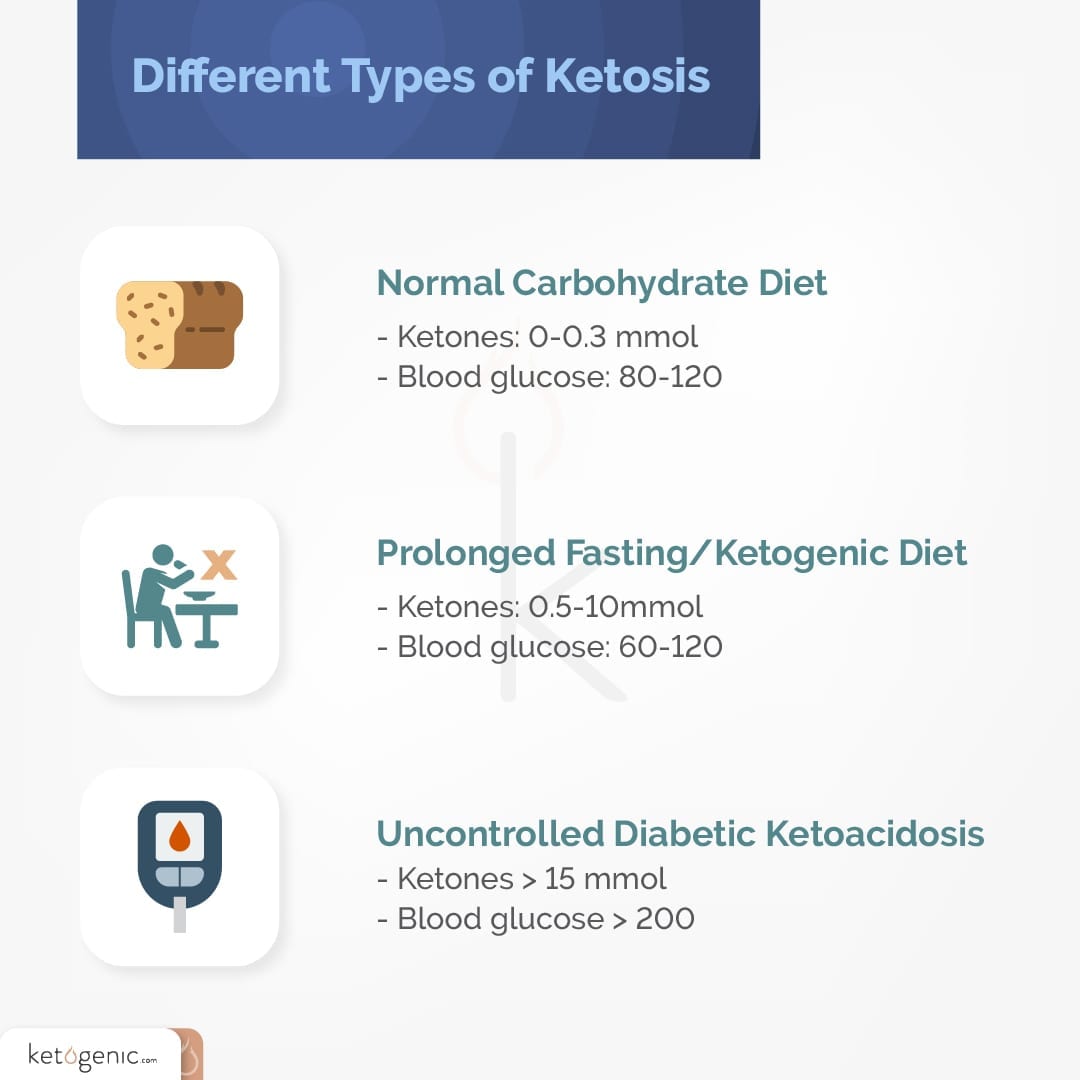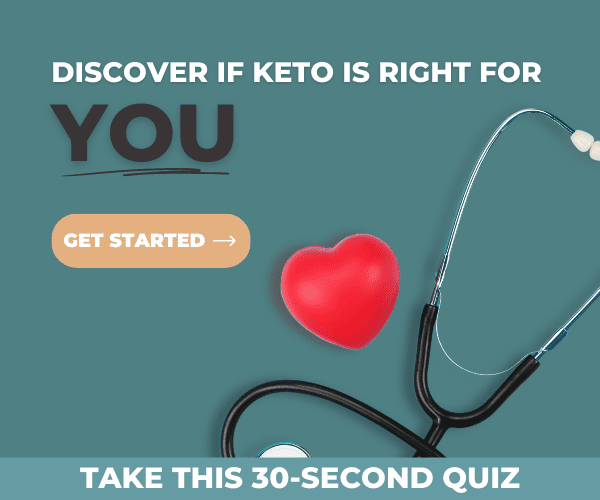
Let’s start off by getting this clear: ketosis is a state of metabolism, not just another fad diet.
Some call the ketogenic diet a positive life-changing nutritional tool while others brush it off as a fad. Is the ketogenic diet just another trend, or is there more to it? How does going keto shift your metabolism? Let’s start by discussing ketosis.
What is Ketosis?
Ketosis is actually a natural metabolic state. With ketosis, your body produces ketone bodies out of fat and uses these ketones for energy instead of carbs.
There are only three macronutrients in the human diet: Carbs, fat, and protein. Your body breaks down the food you eat into these three macronutrients. Keto focuses on high-fat, moderate protein, and low carbohydrate intake.

Following a ketogenic diet puts you into ketosis, which might have several health benefits, such as reducing seizures. [1] [2] [3] [4]
Ketosis occurs when there’s limited access to glucose or blood sugar. On a low-carb diet, your levels of the insulin fat-storage hormone also go down, and your body’s fat stores release fatty acids in large amounts. Most of these fatty acids are transferred to your liver, where they’re turned to ketones.
Ketones can cross the blood-brain barrier and give your brain energy in the absence of glucose. Most of the cells in your brain can use ketones, and the body can use protein to produce the little glucose the brain does require in a process called gluconeogenesis. Ketosis and gluconeogenesis can fulfill the energy needs of your brain [5].

Ketosis is most commonly associated with ketogenic and low-carb diets, but it can also happen in other circumstances, such as during fasting and starvation. It’s important to know the difference between nutritional ketosis and starvation ketosis. Nutritional ketosis means you’re getting plenty of access to healthy, essential vitamins and nutrients.
Starvation ketosis means your body is starved of nutrition in general, which can be damaging for your health. When there’s a lack of calories and your brain and body are more concerned with long-term survival, your body might also slow your metabolism and put the brakes on fat loss [6]. After only three days of starvation, the brain gets around 25% of its energy from ketones.

With long-term starvation, this number spikes to around 60% [7] [8].With fasting ketosis, you have safe and controlled fasting and feeding windows. Fasting is completely safe and healthy for most people and can boost metabolism. Read our helpful article for more on intermittent fasting.
To get into ketosis on a ketogenic diet, most people need to consume less than 50 grams of carbs per day, and for some people, as little as 20 grams per day. This means you have to limit or avoid certain carb-heavy foods from your diet, such as grains, sugary soft drinks, potatoes, and certain fruits. Read our article for a useful, condensed introduction into the ketogenic diet.
To figure out if you’re in ketosis, you can test for ketones in different ways, such as urine strips, breath measurements, and blood testing. You don’t necessarily have to monitor your carbs or macronutrients or test if you’re in ketosis if you feel great and follow a ketogenic diet.
Keto and Metabolism: Why It’s Not A Fad Diet
While some diets might be a passing fad with no valuable scientific evidence conjured up by a passionate fitness fanatic, the ketogenic diet is certainly not a fad.
Your metabolism refers to the daily processes and functions your body uses to create energy. Your metabolism converts food to energy, turns foods into building blocks for protein and fats for your tissues, and eliminates waste from your body. Diet is one of the many factors that can influence your metabolism through the thermic effect of food, hormones, bacteria in the gut, and more [9].
Being in ketosis literally shifts your metabolism and is usually more effective than simply reducing calories and depriving yourself of nutrients, which can actually lower metabolic rate. When you’re burning fat for fuel, your body can maintain a healthy metabolism because there’s energy being burned and nutrients coming in.

A lot of metabolic problems have to do with insulin resistance, and the body no longer responding properly to insulin, which is released when glucose enters your bloodstream. If you’re constantly eating high carbohydrate foods, you’re constantly spiking insulin, alas, the blood sugar rollercoaster comes to fruition. Studies show consuming a ketogenic diet is more effective at improving factors like triglyceride levels, fasting insulin levels, metabolic syndrome, and more, especially when compared to a low-fat diet [10] [11]
Keto changes the expression of metabolic genes to shift you into ketosis. The ketogenic diet can accelerate and improve metabolism [12] [13] [14].
It’s perfectly natural for your body to go into ketosis. If you consider our paleolithic ancestors, they were more metabolically adapted and would go into ketosis during periods of famine or if there weren’t enough carbohydrates available like berries and veggies, and they ate more fish and nuts instead. This would keep their carbohydrate intake low enough to shift their metabolism into ketosis. Our ancestors were accustomed to fasting and periods of feast and famine, which strengthened their metabolism.
Fast forward to today, and most of our modern society isn’t metabolically adapted and spends most of the time consuming high amounts of processed carbohydrates and sugar.
Ketosis isn’t Ketoacidosis
Many people confuse ketosis and ketoacidosis, but these are two completely different things. For more information on this, read our detailed article.
Put simply, ketosis is part of your normal metabolism, but ketoacidosis is a dangerous metabolic condition that can be fatal without proper treatment. With ketoacidosis, the body is flooded with extremely high levels of blood sugar, and ketones. This causes the blood to become acidic, which is harmful [15] [16]

Ketoacidosis is usually associated with uncontrolled type 1 diabetes. Less commonly, it might happen with those with type 2 diabetes. Severe alcohol abuse might also be a contributing factor to ketoacidosis.
Have You Experienced Positive Metabolic Changes That Have Proved Keto Isn’t Just Another Fad Diet?
How has the ketogenic diet shifted your metabolism and changed your life? Have you tried a different fad diet? What was your experience and how did it differ from keto? Comment below and let us know!
References
1. Freeman, J. M. Kossoff, E. H. & Hartman, A. L. (2007). The ketogenic diet: One decade later. Pediatrics, 119(3), 535-543. DOI: 10.1542/peds.2006-2447
2. Levy, R. G., Cooper, P. N., & Giri, P. (2012). Ketogenic diet and other dietary treatments for epilepsy. Cochrane Database Syst Review, DOI: 10.1002/14651858.CD001903.pub2
3. Fukao, T., Lopaschuk, G. D., & Mitchell, G. A. (2004). Pathways and control of ketone body metabolism: On the fringe of lipid biochemistry. Prostaglandins, Leukotriens, & Essential Fatty Acids, 70(3), 243-251. DOI: 10.1016/j.plefa.2003.11.001
4. Owen, O. E., Felig, P., Morgan, A. P., Wahren, J., & Cahill Jr, G. F. (1969). Liver and kidney metabolism during prolonged starvation. Journal of Clinical Investigation, 48(3), 574-583. DOI: 10.1172/JCI106016
5. LaManna, J. C., Salem, N., Puchowicz, M., Erokwu, B., Koppaka, S., Flask, C., & Lee, Z. (2009). Ketones suppress brain glucose consumption. Advances in Experimental Medicine and Biology, DOI: 10.1007/978-0-387-85998-9_45
6. Johannsen, D. L., Knuth, N. D., Huizenga, R., Rood, J. C., Ravussin, E., & Hall, K. D. (2012). Metabolic slowing with massive weight loss despite preservation of fat-free mass. Journal of Clinical Endocrinology & Metabolism, 97(7), 2489-2496. DOI: 10.1210/jc.2012-1444
7. Hasselbalch, S. G., Knudsen, G. M., Jakobsen, J., Hageman, L. P., Holm, S., & Paulson, O. B. (1994). Brain metabolism during short-term starvation in humans. Journal of Cerebral Blood Flow & Metabolism, 14(1), 125-131. DOI: 10.1038/jcbfm.1994.17
8. Owen, O. E., Morgan, A. P., Kemp, H. G., Sullivan, J. M., Herrera, M. G., & Cahill Jr, G. F. (1967). Brain metabolism during fasting. Journal of Clinical Investigation, 46(10), 1589-1595. DOI: 10.1172/JCI105650
9. Turnbaugh, P. J. (2017). Microbes and diet-induced obesity: Fast, cheap, and out of control. Cell Host & Microbe, 21(3), 278-281. DOI: 10.1016/j.chom.2017.02.021
10. Volek, J. S., Phinney, S. D., Forsythe, C. E., Quann, E. E., Wood, R. J., Puglisi, M. J., Kraemer, W. J., Bibus, D. M., Fernandez, M. L., & Feinman, R. D. (2009). Carbohydrate restriction has a more favorable impact on the metabolic syndrome than a low-fat diet. Lipids, 44(4), 297-309. DOI: 10.1007/s11745-008-3274-2
11. Yancy Jr, W. S., Westman, E. C., McDuffie, J. R., Grambow, S. C., Jeffreys, A. S., Bolton, J., Chalecki, A., & Oddone, E. Z. (2010). A randomized trial of a low-carbohydrate diet vs orlistat plus a low-fat diet for weight loss. Archives of Internal Medicine, 170(2)m 136-145. DOI: 10.1001/archinternmed.2009.492
12. Nakao, R., Shimba, S., & Oishi, K. (2017). Ketogenic diet induces expression of the muscle circadian gene Slc25a25 via neural pathway that might be involved in muscle thermogenesis. Science Reports, 7(1), 2885. DOI: 10.1038/s41598-017-03119-8
13. Hutfles, L. J., Wilkins, H. M., Koppel, S. J., Weidling, I. W., Selfridge, J. E., Tan, E., Thyfault, J. P., Slawson, C., Fenton, A. W., Zhu, H., & Swerdlow, R. H. (2017). A bioenergetics systems evaluation of ketogenic diet liver effects. Applied Physiology, Nutrition, & Metabolism, 42(9), 955-962. DOI: 10.1139/apnm-2017-0068
14. Stafford, P., Abdelwahab, M. G., Kim, D. Y., Preul, M. C., Rho, J. M., & Scheck, A. C. (2010). The ketogenic diet reverses gene expression patterns and reduces reactive oxygen species levels when used as an adjuvant therapy for glioma. Nutrition & Metabolism, DOI: 10.1186/1743-7075-7-74
15. Gosmanov, A. R., Gosmanova, E. O., & Dillard-Cannon, E. (2014). Management of adult diabetic ketoacidosis. Diabetes, Metabolic Syndrome, and Obesity, DOI: 10.2147/DMSO.S50516
16. McGuire, L. C., Cruickshank, A. M., & Munro, P. T. (2006). Alcoholic ketoacidosis. Emergency Medicine Journal, 23(6), 417-420. DOI: 10.1136/emj.2004.017590
References
Freeman, J. M. Kossoff, E. H. & Hartman, A. L. (2007). The ketogenic diet: One decade later. Pediatrics, 119(3), 535-543.
Levy, R. G., Cooper, P. N., & Giri, P. (2012). Ketogenic diet and other dietary treatments for epilepsy.Cochrane Database Syst Review,
Fukao, T., Lopaschuk, G. D., & Mitchell, G. A. (2004). Pathways and control of ketone body metabolism: On the fringe of lipid biochemistry. Prostaglandins, Leukotriens, & Essential Fatty Acids, 70(3), 243-251.
Owen, O. E., Felig, P., Morgan, A. P., Wahren, J., & Cahill Jr, G. F. (1969). Liver and kidney metabolism during prolonged starvation.Journal of Clinical Investigation, 48(3), 574-583.
LaManna, J. C., Salem, N., Puchowicz, M., Erokwu, B., Koppaka, S., Flask, C., & Lee, Z. (2009). Ketones suppress brain glucose consumption.Advances in Experimental Medicine and Biology,
Johannsen, D. L., Knuth, N. D., Huizenga, R., Rood, J. C., Ravussin, E., & Hall, K. D. (2012). Metabolic slowing with massive weight loss despite preservation of fat-free mass.Journal of Clinical Endocrinology & Metabolism, 97(7), 2489-2496.
Hasselbalch, S. G., Knudsen, G. M., Jakobsen, J., Hageman, L. P., Holm, S., & Paulson, O. B. (1994). Brain metabolism during short-term starvation in humans.Journal of Cerebral Blood Flow & Metabolism, 14(1), 125-131.
Owen, O. E., Morgan, A. P., Kemp, H. G., Sullivan, J. M., Herrera, M. G., & Cahill Jr, G. F. (1967). Brain metabolism during fasting. Journal of Clinical Investigation, 46(10), 1589-1595.
Turnbaugh, P. J. (2017). Microbes and diet-induced obesity: Fast, cheap, and out of control. Cell Host & Microbe, 21(3), 278-281.
Volek, J. S., Phinney, S. D., Forsythe, C. E., Quann, E. E., Wood, R. J., Puglisi, M. J., Kraemer, W. J., Bibus, D. M., Fernandez, M. L., & Feinman, R. D. (2009). Carbohydrate restriction has a more favorable impact on the metabolic syndrome than a low-fat diet. Lipids, 44(4), 297-309.
Yancy Jr, W. S., Westman, E. C., McDuffie, J. R., Grambow, S. C., Jeffreys, A. S., Bolton, J., Chalecki, A., & Oddone, E. Z. (2010). A randomized trial of a low-carbohydrate diet vs orlistat plus a low-fat diet for weight loss. Archives of Internal Medicine, 170(2)m 136-145.
Nakao, R., Shimba, S., & Oishi, K. (2017). Ketogenic diet induces expression of the muscle circadian gene Slc25a25 via neural pathway that might be involved in muscle thermogenesis. Science Reports, 7(1), 2885.
Hutfles, L. J., Wilkins, H. M., Koppel, S. J., Weidling, I. W., Selfridge, J. E., Tan, E., Thyfault, J. P., Slawson, C., Fenton, A. W., Zhu, H., & Swerdlow, R. H. (2017). A bioenergetics systems evaluation of ketogenic diet liver effects. Applied Physiology, Nutrition, & Metabolism, 42(9), 955-962.
Stafford, P., Abdelwahab, M. G., Kim, D. Y., Preul, M. C., Rho, J. M., & Scheck, A. C. (2010). The ketogenic diet reverses gene expression patterns and reduces reactive oxygen species levels when used as an adjuvant therapy for glioma.Nutrition & Metabolism,
Gosmanov, A. R., Gosmanova, E. O., & Dillard-Cannon, E. (2014). Management of adult diabetic ketoacidosis. Diabetes, Metabolic Syndrome, and Obesity
McGuire, L. C., Cruickshank, A. M., & Munro, P. T. (2006). Alcoholic ketoacidosis.Emergency Medicine Journal, 23(6), 417-420.










Male 5-10, 59 yrs, 193lbs, BMI 27.1, BG 316 on 2/14/22. I have been on keto just over 2 weeks, probably entering ketosis on the 3rd day (3/14). Energy way up, losing weight consistently, down one belt hole and getting looser (visceral fat). Hunger pretty much gone, not like starving on 45% carb ADA (2/17 to 3/11) diet eating 6 times daily and going from bloated to famished. Now eating within 6-8 hour window daily, breakfast has mostly become lunch. (3/26/22) 180.8 lbs, blood glucose 73. Eating broccoli, spinach, zucchini, avocado, leaf lettuce, tomato daily, 2-4 eggs daily, salmon 1-2 and sardines 2-3 weekly, ground beef, steak, bacon, chicken. Nuts, seeds and cheese almost every day, cream in coffee, green tea, always water. Minimal snacking (nuts, olives, cheese) usually prior to drinking one beer twice weekly. Keto with IF is a science based, natural and commonsense (deep down we all know it’s true) way to eat. Look at the fat content in real food, eggs 64%, nuts 79%, butter and olive oil 100%, chicken wings 66%, 80/20 ground beef 72% and avocado 85%. Nothing metabolically special has to happen for our bodies to use fat instead of carbs, it is a completely natural and normal process. God designed us to have natural fats in our diet, it is that simple, unprocessed real food. Drink water, eat veggies, eat whole foods, meats and dairy and live better longer.